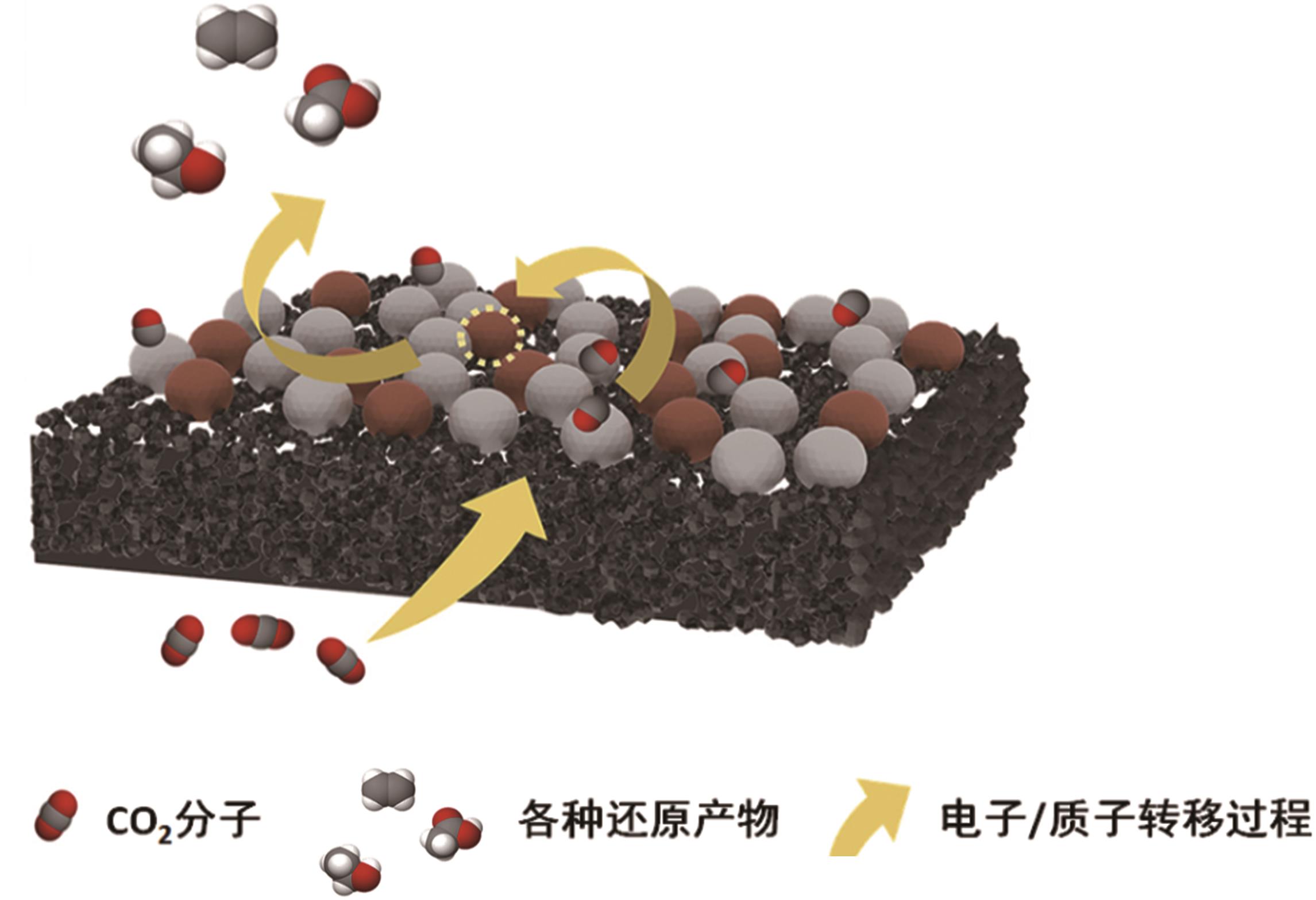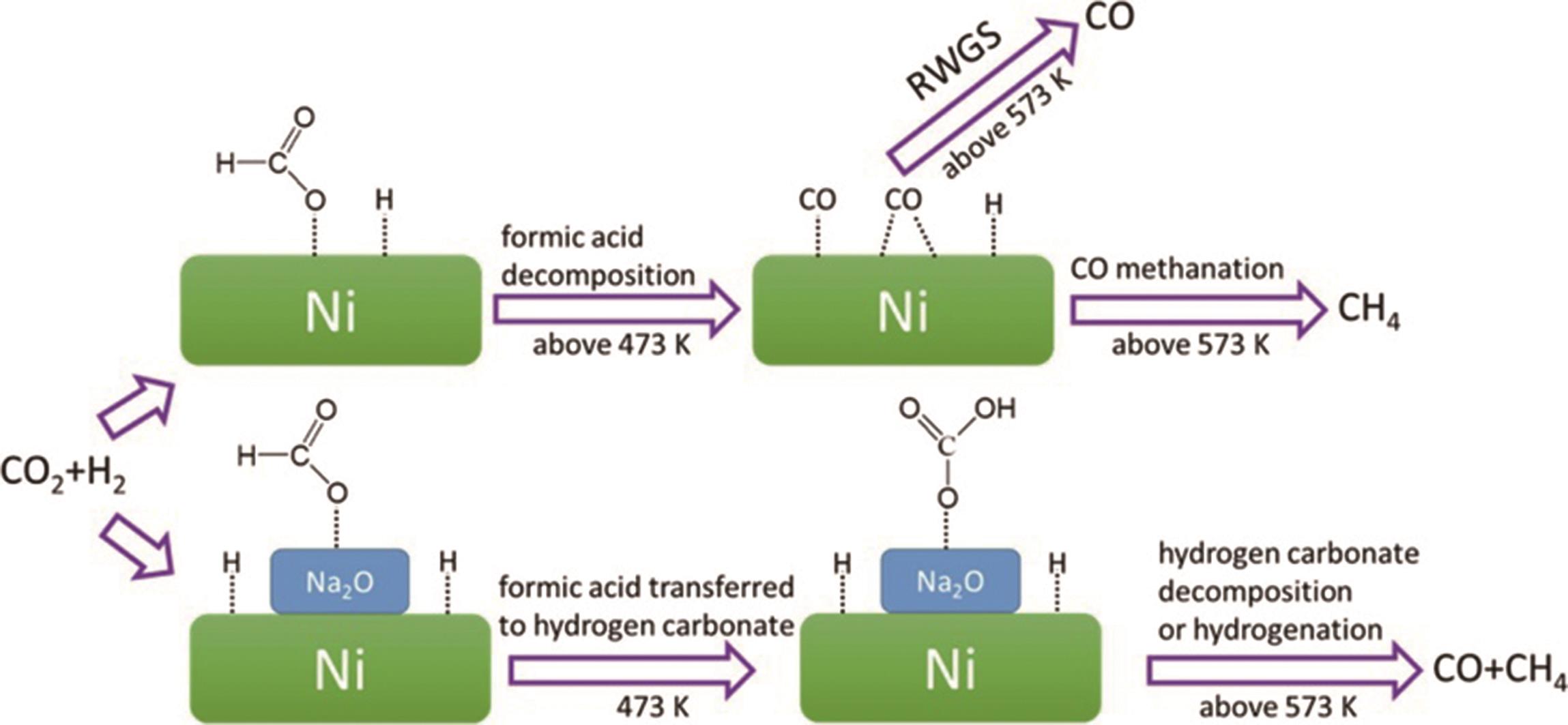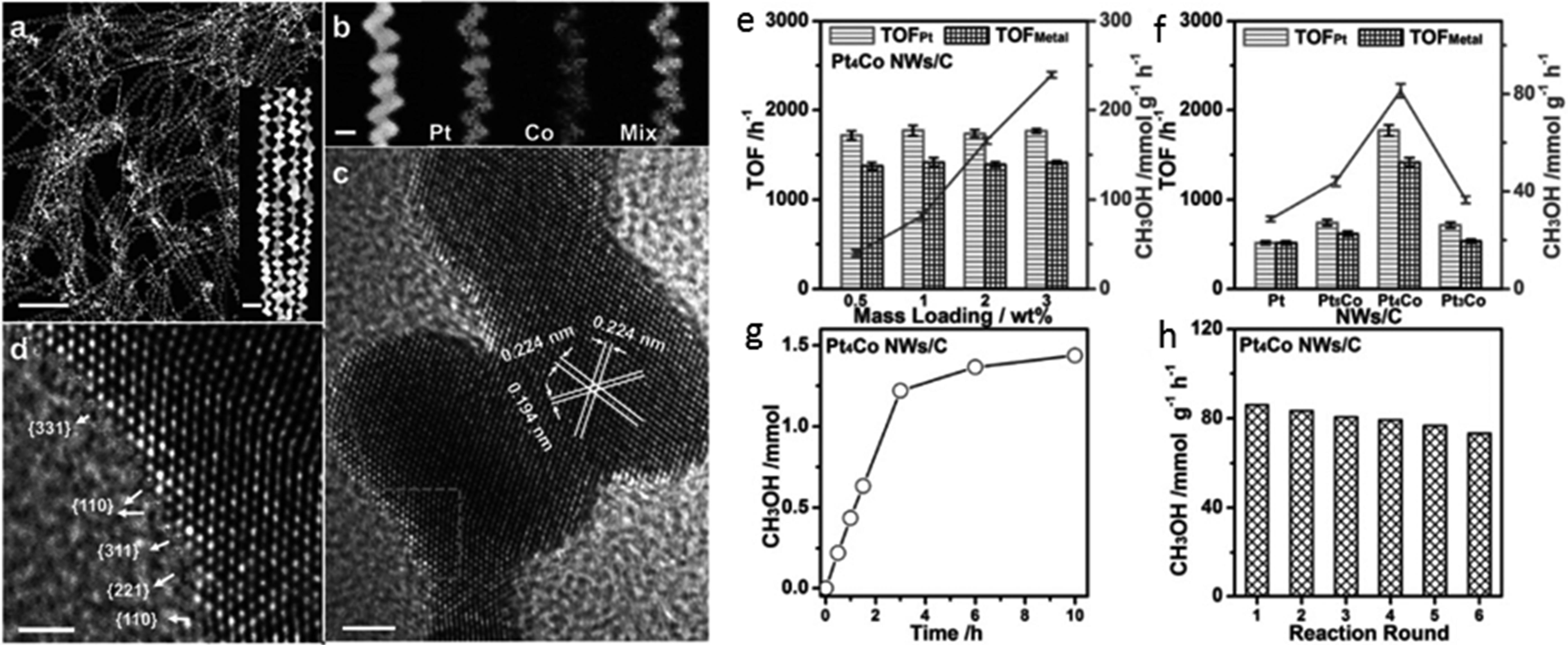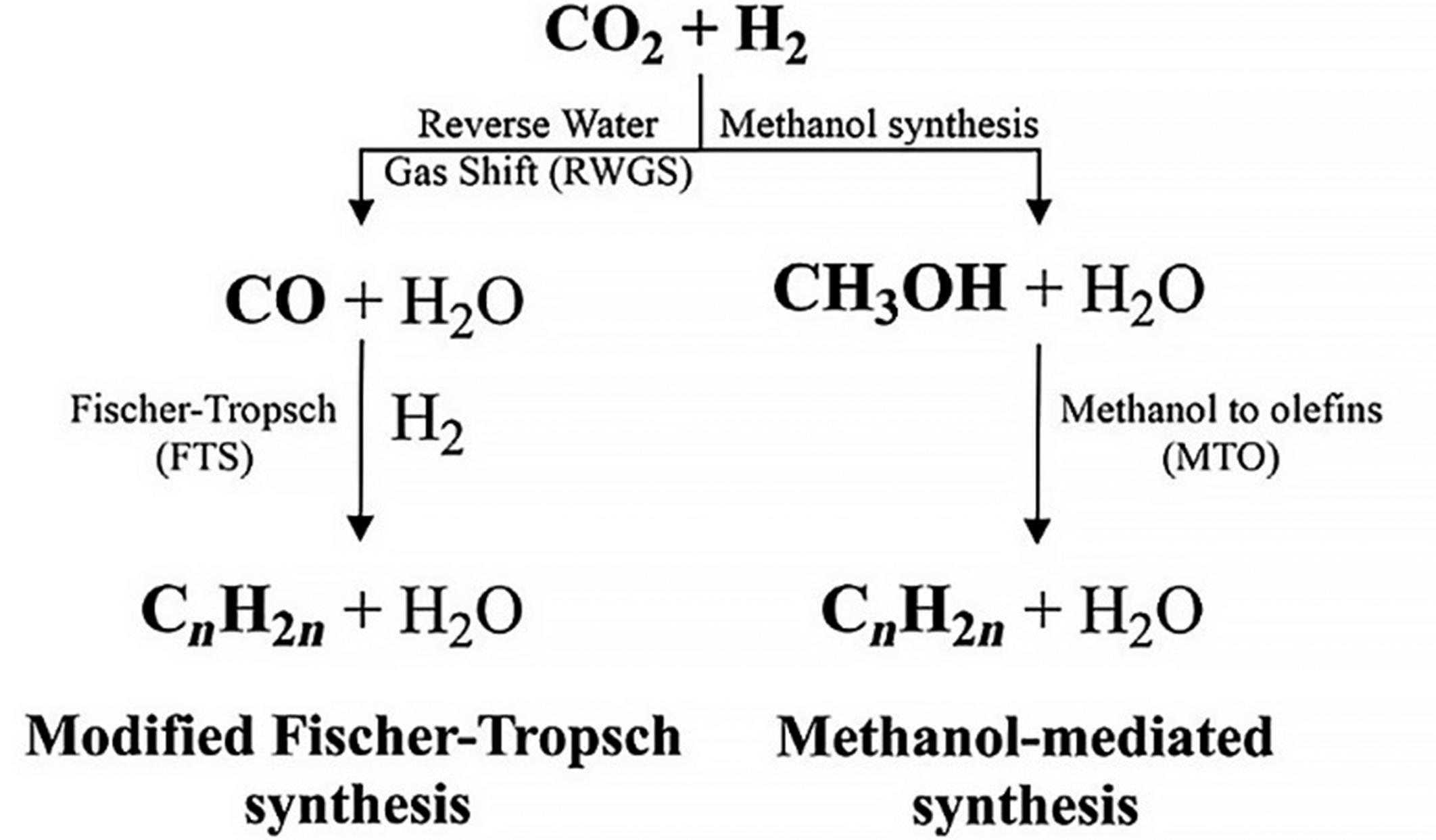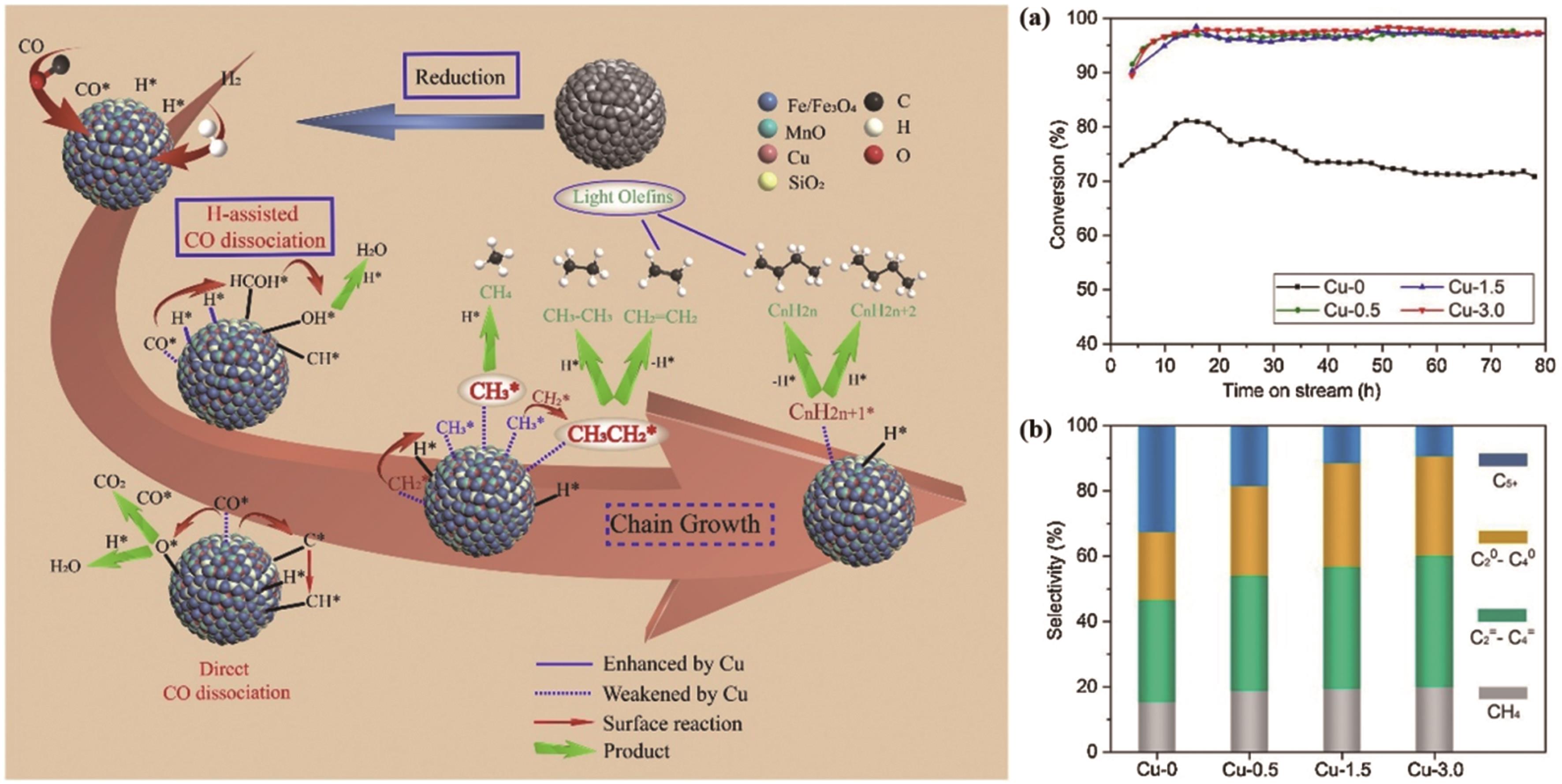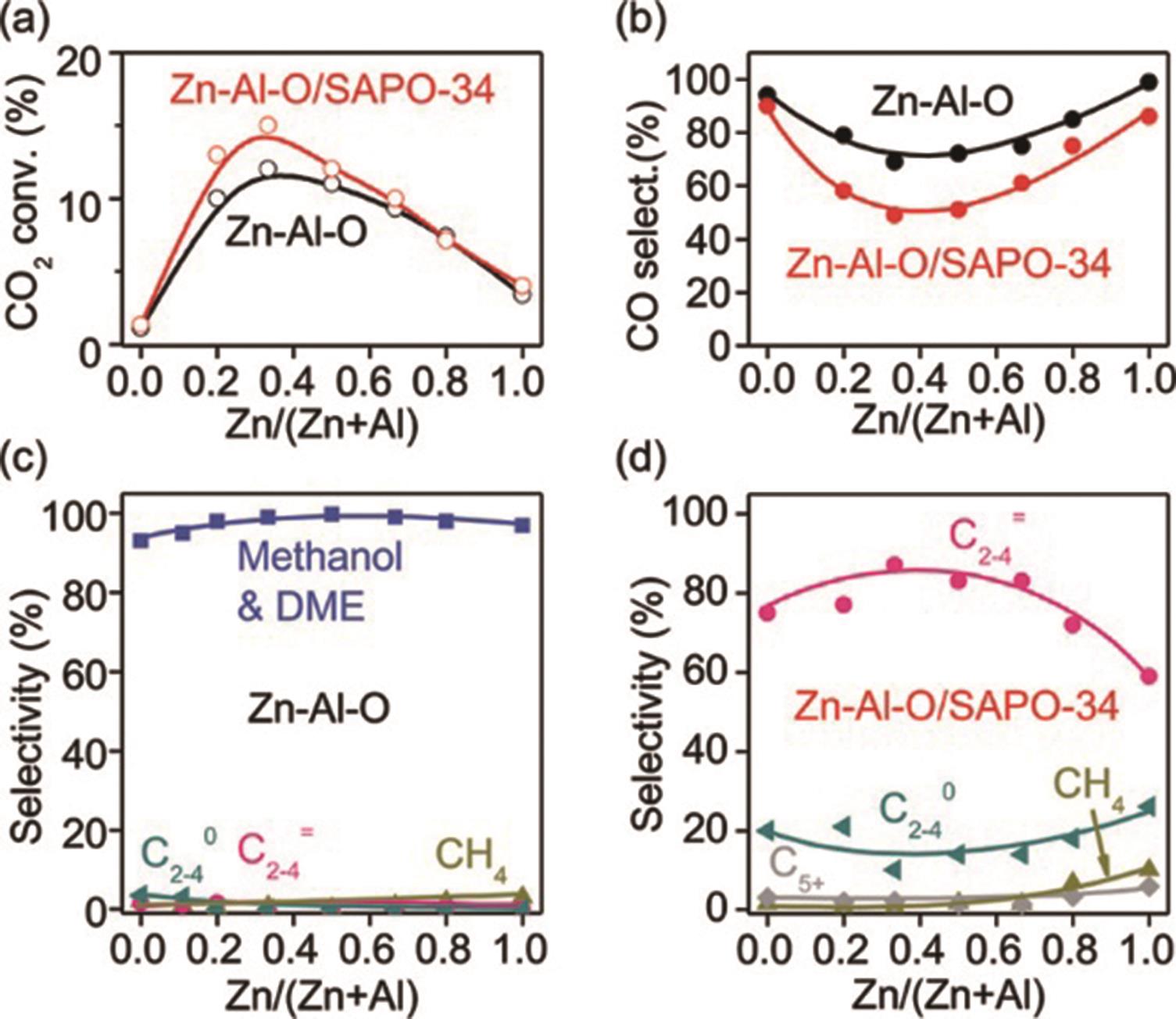
Chinese Journal of Applied Chemistry ›› 2022, Vol. 39 ›› Issue (4): 599-615.DOI: 10.19894/j.issn.1000-0518.210451
• Review • Previous Articles Next Articles
Artificial Carbon Sequestration Technology—Research Progress on the Catalysts for Thermal Catalytic Reduction of CO2
Xue-Ting WU, Yang YU( ), Shu-Yan SONG(
), Shu-Yan SONG( ), Hong-Jie ZHANG
), Hong-Jie ZHANG
- State Key Laboratory of Rare Earth Resources Utilization,Changchun Institute of Applied Chemistry,Chinese Academy of Sciences,Changchun 130022,China
-
Received:2021-09-05Accepted:2021-11-25Published:2022-04-01Online:2022-04-19 -
Contact:Yang YU,Shu-Yan SONG -
About author:songsy@ciac.ac.cn
-
Supported by:the National Natural Science Foundation of China(21771173);the National Key R&D Program(2016YFA0203200)
CLC Number:
Cite this article
Xue-Ting WU, Yang YU, Shu-Yan SONG, Hong-Jie ZHANG. Artificial Carbon Sequestration Technology—Research Progress on the Catalysts for Thermal Catalytic Reduction of CO2[J]. Chinese Journal of Applied Chemistry, 2022, 39(4): 599-615.
share this article
Add to citation manager EndNote|Ris|BibTeX
URL: http://yyhx.ciac.jl.cn/EN/10.19894/j.issn.1000-0518.210451
催化剂 Catalyst | n(H2)∶n(CO2) | 温度 Temperature/℃ | 压力 Pressure/MPa | GHSV/ (mL·g-1·h-1) | CO2转化率 Conversion/% | 选择性 Selectivity/% | 文献 Ref. | |
|---|---|---|---|---|---|---|---|---|
甲烷 Methane | 20%Ni?TiO2 | 4∶1 | 350 | -- | 48 000 | 52 | 98 | [ |
| Ni?5Mg/SBA?15?AE | 4∶1 | 350 | -- | 30 000 | 73 | 98 | [ | |
| Ni/Pr?Ce | 4∶1 | 350 | -- | 25 000 | 54.5 | 100 | [ | |
| NiO/Zn0.3Zr0.7 | 4∶1 | 500 | -- | 24 000 | 79 | 94 | [ | |
| 8%Ni@NaX | 4∶1 | 380 | 0.1 | 15 000 | 92.70 | ≈99.9 | [ | |
| RuSA/TiO2* | 4∶1 | 340 | 0.1 | 16 500 | 15.6 | 97.3 | [ | |
| 0.89%RuSA/CeO2 | 4∶1 | 260 | 0.1 | 4 800 | 28 | 100 | [ | |
甲醇 Methanol | ZrO2/Cu?0.1 | 3∶1 | 220 | 3 | 48 000 | <5 | 70 | [ |
| Cu1La0.2/SBA?15 | 3∶1 | 240 | 3 | 12 000 | 5.7 | 81.2 | [ | |
| Pd?CZ?0.01 | 3∶1 | 150 | 4.5 | 10 800 | 30 | 65 | [ | |
| 10Cu/CeO2 | 3∶1 | 190 | 3 | 3 000 | 1.8 | 84 | [ | |
| 1Pd?10Cu/CeO2 | 3∶1 | 270 | 3 | 3 000 | 17.8 | 23.7 | [ | |
| Pd@Zn | 3∶1 | 250 | 2 | 18 000 | 5 | 70.5 | [ | |
| In2O3/ZrO2 | 4∶1 | 300 | 5 | 16 000 | 5.2 | 99.8 | [ | |
轻烯烃 Light olefin | 35Fe?7Zr?1Ce?K | 3∶1 | 320 | 2 | 6 000 | 57.3 | 55.6 | [ |
Fe?Co/K?Al2O3 (Fe/K=2.5) | 3∶1 | 320 | 2 | 9 000 | 41.4 | 45 | [ | |
| C?Fe?Zn/K | 3∶1 | 320 | 2 | 3 000 | 54.8 | 57.4 | [ | |
| Na?Fe3O4/HZSM?5 | 3∶1 | 320 | 1.1 | 3 600 | 22 | 46.6 | [ | |
| Fe/C+K(0.75) | 3∶1 | 350 | 3 | 24 000 | 38.5 | 38.8 | [ | |
| In?Zr/SAPO?34 | 3∶1 | 400 | 3 | 9 000 | 30 | 84 | [ | |
| ZnZrO/SAPO | 3∶1 | 380 | 2 | 3 600 | 12.6 | 80 | [ | |
| ZnGa2O4/SAPO?34 | 3∶1 | 370 | 3 | 5 400 | 13 | 86 | [ | |
| ZnAl2O4/SAPO?34 | 3∶1 | 370 | 3 | 5 400 | 15 | 87 | [ |
Table 1 Summary of the performance of catalysts for different products by CO2 hydrogenation
催化剂 Catalyst | n(H2)∶n(CO2) | 温度 Temperature/℃ | 压力 Pressure/MPa | GHSV/ (mL·g-1·h-1) | CO2转化率 Conversion/% | 选择性 Selectivity/% | 文献 Ref. | |
|---|---|---|---|---|---|---|---|---|
甲烷 Methane | 20%Ni?TiO2 | 4∶1 | 350 | -- | 48 000 | 52 | 98 | [ |
| Ni?5Mg/SBA?15?AE | 4∶1 | 350 | -- | 30 000 | 73 | 98 | [ | |
| Ni/Pr?Ce | 4∶1 | 350 | -- | 25 000 | 54.5 | 100 | [ | |
| NiO/Zn0.3Zr0.7 | 4∶1 | 500 | -- | 24 000 | 79 | 94 | [ | |
| 8%Ni@NaX | 4∶1 | 380 | 0.1 | 15 000 | 92.70 | ≈99.9 | [ | |
| RuSA/TiO2* | 4∶1 | 340 | 0.1 | 16 500 | 15.6 | 97.3 | [ | |
| 0.89%RuSA/CeO2 | 4∶1 | 260 | 0.1 | 4 800 | 28 | 100 | [ | |
甲醇 Methanol | ZrO2/Cu?0.1 | 3∶1 | 220 | 3 | 48 000 | <5 | 70 | [ |
| Cu1La0.2/SBA?15 | 3∶1 | 240 | 3 | 12 000 | 5.7 | 81.2 | [ | |
| Pd?CZ?0.01 | 3∶1 | 150 | 4.5 | 10 800 | 30 | 65 | [ | |
| 10Cu/CeO2 | 3∶1 | 190 | 3 | 3 000 | 1.8 | 84 | [ | |
| 1Pd?10Cu/CeO2 | 3∶1 | 270 | 3 | 3 000 | 17.8 | 23.7 | [ | |
| Pd@Zn | 3∶1 | 250 | 2 | 18 000 | 5 | 70.5 | [ | |
| In2O3/ZrO2 | 4∶1 | 300 | 5 | 16 000 | 5.2 | 99.8 | [ | |
轻烯烃 Light olefin | 35Fe?7Zr?1Ce?K | 3∶1 | 320 | 2 | 6 000 | 57.3 | 55.6 | [ |
Fe?Co/K?Al2O3 (Fe/K=2.5) | 3∶1 | 320 | 2 | 9 000 | 41.4 | 45 | [ | |
| C?Fe?Zn/K | 3∶1 | 320 | 2 | 3 000 | 54.8 | 57.4 | [ | |
| Na?Fe3O4/HZSM?5 | 3∶1 | 320 | 1.1 | 3 600 | 22 | 46.6 | [ | |
| Fe/C+K(0.75) | 3∶1 | 350 | 3 | 24 000 | 38.5 | 38.8 | [ | |
| In?Zr/SAPO?34 | 3∶1 | 400 | 3 | 9 000 | 30 | 84 | [ | |
| ZnZrO/SAPO | 3∶1 | 380 | 2 | 3 600 | 12.6 | 80 | [ | |
| ZnGa2O4/SAPO?34 | 3∶1 | 370 | 3 | 5 400 | 13 | 86 | [ | |
| ZnAl2O4/SAPO?34 | 3∶1 | 370 | 3 | 5 400 | 15 | 87 | [ |
催化剂 Catalyst | CO2转化率 CO2 conversion/% | CH4产率 CH4 yield/% | CH4选择性 CH4 selectivity/% |
|---|---|---|---|
| Ni/Ce | 39.4 | 39.4 | 100 |
| Ni/Sm?Ce | 44.9 | 44.9 | 100 |
| Ni/Pr?Ce | 54.5 | 54.5 | 100 |
| Ni/Mg?Ce | 43.2 | 43.2 | 100 |
Table 2 Reaction performance of different catalysts[19]
催化剂 Catalyst | CO2转化率 CO2 conversion/% | CH4产率 CH4 yield/% | CH4选择性 CH4 selectivity/% |
|---|---|---|---|
| Ni/Ce | 39.4 | 39.4 | 100 |
| Ni/Sm?Ce | 44.9 | 44.9 | 100 |
| Ni/Pr?Ce | 54.5 | 54.5 | 100 |
| Ni/Mg?Ce | 43.2 | 43.2 | 100 |
催化剂 Catalyst | CO2转化率 CO2 conversion/% | CO选择性/% CO selectivity/% | CH4选择性 CH4 selectivity/% |
|---|---|---|---|
| NiSA/CNTox-400 | 5.4 | 93.7 | 6.3 |
| NiSA?Na/CNTox-400 | 8.1 | 95.5 | 4.5 |
| RuSA/CNTox-400 | 8.4 | 56.0 | 44.0 |
| RuSA?Na/CNTox-400 | 20.2 | 79.5 | 20.5 |
| NiSA/TiO2* | 11.8 | 99.6 | 0.4 |
| Ni/TiO2 | 2.8 | 99.3 | 0.7 |
| RuSA/TiO2* | 15.6 | 2.7 | 97.3 |
| Ru/TiO2* | 11.5 | 3.6 | 96.4 |
Table 3 Reaction performance of different catalysts[43]
催化剂 Catalyst | CO2转化率 CO2 conversion/% | CO选择性/% CO selectivity/% | CH4选择性 CH4 selectivity/% |
|---|---|---|---|
| NiSA/CNTox-400 | 5.4 | 93.7 | 6.3 |
| NiSA?Na/CNTox-400 | 8.1 | 95.5 | 4.5 |
| RuSA/CNTox-400 | 8.4 | 56.0 | 44.0 |
| RuSA?Na/CNTox-400 | 20.2 | 79.5 | 20.5 |
| NiSA/TiO2* | 11.8 | 99.6 | 0.4 |
| Ni/TiO2 | 2.8 | 99.3 | 0.7 |
| RuSA/TiO2* | 15.6 | 2.7 | 97.3 |
| Ru/TiO2* | 11.5 | 3.6 | 96.4 |
催化剂 Catalyst | CO2转化率 CO2 conversion/% | C2-C4烯烃产率 C2-C4 olefin/% | 烯烃/烷烃摩尔比 n(olefin)∶n(paraffin) |
|---|---|---|---|
| Fe/K?Al2O3 | 34.0 | 45.5 | 6.7∶1 |
| Fe?Cu/K?Al2O3 | 36.0 | 42.2 | 5.4∶1 |
| Fe?Zn/K?Al2O3 | 34.2 | 42.6 | 5.6∶1 |
| Fe?Co/K?Al2O3 | 40.0 | 46.1 | 5.9∶1 |
| Fe?Mn/K?Al2O3 | 29.4 | 48.7 | 7.4∶1 |
| Fe?V/K?Al2O3 | 30.6 | 44.9 | 6.4∶1 |
Table 4 Distribution of various products of CO2 hydrogenation catalyzed by improved Fe/K?based catalyst [50]
催化剂 Catalyst | CO2转化率 CO2 conversion/% | C2-C4烯烃产率 C2-C4 olefin/% | 烯烃/烷烃摩尔比 n(olefin)∶n(paraffin) |
|---|---|---|---|
| Fe/K?Al2O3 | 34.0 | 45.5 | 6.7∶1 |
| Fe?Cu/K?Al2O3 | 36.0 | 42.2 | 5.4∶1 |
| Fe?Zn/K?Al2O3 | 34.2 | 42.6 | 5.6∶1 |
| Fe?Co/K?Al2O3 | 40.0 | 46.1 | 5.9∶1 |
| Fe?Mn/K?Al2O3 | 29.4 | 48.7 | 7.4∶1 |
| Fe?V/K?Al2O3 | 30.6 | 44.9 | 6.4∶1 |
| 1 | NIU Y, HUANG X, WANG Y, et al. Manipulating interstitial carbon atoms in the nickel octahedral site for highly efficient hydrogenation of alkyne[J]. Nat Commun, 2020, 11(1): 3324. |
| 2 | LIU S, NIU Y, WANG Y, et al. Unravelling the role of active-site isolation in reactivity and reaction pathway control for acetylene hydrogenation[J]. Chem Commun, 2020, 56(47): 6372-6375. |
| 3 | NIU Y, LIU X, WANG Y, et al. Visualizing formation of intermetallic PdZn in a palladium/zinc oxide catalyst: interfacial fertilization by PdHx[J]. Angew Chem Int Ed, 2019, 58(13): 4232-4237. |
| 4 | JIANG X, NIE X, GUO X, et al. Recent advances in carbon dioxide hydrogenation to methanol via heterogeneous catalysis[J]. Chem Rev, 2020, 120(15): 7984-8034. |
| 5 | LONG Y, LI J, WU L, et al. One-pot synthesis of cobalt-doped Pt-Au alloy nanoparticles supported on ultrathin alpha-Co(OH)2 nanosheets and their enhanced performance in the reduction of p-nitrophenol[J]. Eur J Inorg Chem, 2017, (1): 146-152. |
| 6 | PAN J, ZHANG L, ZHANG S, et al. Half-encapsulated Au nanorods@CeO2 core@shell nanostructures for near-infrared plasmon-enhanced catalysis[J]. ACS Appl Nano Mater, 2019, 2(3): 1516-1524. |
| 7 | LI J, SONG S, LONG Y, et al. Investigating the hybrid-structure-effect of CeO2-encapsulated Au nanostructures on the transfer coupling of nitrobenzene[J]. Adv Mater, 2018, 30(7): 1704416. |
| 8 | LI J, LONG Y, LIU Y, et al. Robust synthesis of gold-based multishell structures as plasmonic catalysts for selective hydrogenation of 4-nitrostyrene[J]. Angew Chem Int Ed, 2020, 59(3): 1103-1107. |
| 9 | LONG Y, LI J, WU L, et al. Construction of trace silver modified core@shell structured Pt-Ni nanoframe@CeO2 for semihydrogenation of phenylacetylene[J]. Nano Res, 2019, 12(4): 869-875. |
| 10 | SONG S, LI K, PAN J, et al. Achieving the trade-off between selectivity and activity in semihydrogenation of alkynes by fabrication of (asymmetrical Pd@Ag core)@(CeO2 shell) nanocatalysts via autoredox reaction[J]. Adv Mater, 2017, 29(8): 1605332. |
| 11 | LIU Y, WANG Q, WU L, et al. Tunable bimetallic Au-Pd@CeO2 for semihydrogenation of phenylacetylene by ammonia borane[J]. Nanoscale, 2019, 11(27): 12932-12937. |
| 12 | SONG S, LIU X, LI J, et al. Confining the nucleation of Pt to in situ form (Pt-enriched cage)@CeO2 core@shell nanostructure as excellent catalysts for hydrogenation reactions[J]. Adv Mater, 2017, 29(28): 1700495. |
| 13 | LONG Y, SONG S, LI J, et al. Pt/CeO2@MOF core@shell nanoreactor for selective hydrogenation of furfural via the channel screening effect[J]. ACS Catal, 2018, 8(9): 8506-8512. |
| 14 | XU J, ZHU J, LIU Y, et al. In situ construction of Pt-Ni NF@Ni-MOF-74 for selective hydrogenation of p-nitrostyrene by ammonia borane[J]. Chem Eur J, 2020, 26(55): 12539-12543. |
| 15 | WANG Q, LI J, WANG X, et al. Surfactant-guided synthesis of porous Pt shells with ordered tangential channels, coated on Pd nanostructures, and their enhanced catalytic activities[J]. Chem Eur J, 2018, 24(58): 15649-15655. |
| 16 | XU J, YANG W, SONG S, et al. Ultra-small noble metal ceria-based catalytic materials: from synthesis to application[J]. Eur J Inorg Chem, 2021, 2021(8): 689-701. |
| 17 | WU H C, CHEN T C, WU J H, et al. Influence of sodium-modified Ni/SiO2 catalysts on the tunable selectivity of CO2 hydrogenation: effect of the CH4 selectivity, reaction pathway and mechanism on the catalytic reaction[J]. J Colloid Interf Sci, 2021, 586: 514-527. |
| 18 | HONGMANOROM P, ASHOK J, ZHANG G, et al. Enhanced performance and selectivity of CO2 methanation over phyllosilicate structure derived Ni-Mg/SBA-15 catalysts[J]. Appl Catal B, 2021, 282: 119564. |
| 19 | SIAKAVELAS G I, CHARISIOU N D, ALKHOORI S, et al. Highly selective and stable nickel catalysts supported on ceria promoted with Sm2O3, Pr2O3 and MgO for the CO2 methanation reaction[J]. Appl Catal B, 2021, 282: 119562. |
| 20 | WU C Y, LIN L L, LIU J J, et al. Inverse ZrO2/Cu as a highly efficient methanol synthesis catalyst from CO2 hydrogenation[J]. Nat Commun, 2020, 11(1): 5767. |
| 21 | CHEN K, FANG H, WU S, et al. CO2 hydrogenation to methanol over Cu catalysts supported on La-modified SBA-15: the crucial role of Cu-LaOx interfaces[J]. Appl Catal B, 2019, 251: 119-129. |
| 22 | HU B, YIN Y Z, LIU G L, et al. Hydrogen spillover enabled active Cu sites for methanol synthesis from CO2 hydrogenation over Pd doped CuZn catalysts[J]. J Catal, 2018, 359: 17-26. |
| 23 | NUMPILAI T, CHANLEK N, POO-ARPORN Y, et al. Pore size effects on physicochemical properties of Fe-Co/K-Al2O3 catalysts and their catalytic activity in CO2 hydrogenation to light olefins[J]. Appl Surf Sci, 2019, 483: 581-592. |
| 24 | SATTHAWONG R, KOIZUMI N, SONG C S, et al. Comparative study on CO2 hydrogenation to higher hydrocarbons over Fe-based bimetallic catalysts[J]. Top Catal, 2014, 57(6/7/8/9): 588-594. |
| 25 | RAMIREZ A, GEVERS L, BAVYKINA A, et al. Metal organic framework-derived iron catalysts for the direct hydrogenation of CO2 to short chain olefins[J]. ACS Catal, 2018, 8(10): 9174-9182. |
| 26 | RUI N, ZHANG X, ZHANG F, et al. Highly active Ni/CeO2 catalyst for CO2 methanation: preparation and characterization[J]. Appl Catal B, 2021, 282: 119581. |
| 27 | XIE Z H, TIAN D, XIE M, et al. Interfacial active sites for CO2 assisted selective cleavage of C—C/C—H bonds in ethane[J]. Chem, 2020, 6(10): 2703-2716. |
| 28 | YAN B H, YAO S Y, KATTEL S, et al. Active sites for tandem reactions of CO2 reduction and ethane dehydrogenation[J]. Proc Natl Acad Sci USA, 2018, 115(33): 8278-8283. |
| 29 | LI S W, XU Y, CHEN Y F, et al. Tuning the selectivity of catalytic carbon dioxide hydrogenation over iridium/cerium oxide catalysts with a strong metal-support interaction[J]. Angew Chem Int Ed, 2017, 56(36): 10761-10765. |
| 30 | YE R P, DING J, GONG W, et al. CO2 hydrogenation to high-value products via heterogeneous catalysis[J]. Nat Commun, 2019, 10: 5698. |
| 31 | MOTA F M, KIM D H. From CO2 methanation to ambitious long-chain hydrocarbons: alternative fuels paving the path to sustainability[J]. Chem Soc Rev, 2019, 48(1): 205-259. |
| 32 | ZHAO Y, GAO W, LI S, et al. Solar-versus thermal-driven catalysis for energy conversion[J]. Joule, 2019, 3(4): 920-937. |
| 33 | XIE S, ZHANG Q, LIU G, et al. Photocatalytic and photoelectrocatalytic reduction of CO2 using heterogeneous catalysts with controlled nanostructures[J]. Chem Commun, 2016, 52(1): 35-59. |
| 34 | YANG F, ELNABAWY A O, SCHIMMENTI R, et al. Bismuthene for highly efficient carbon dioxide electroreduction reaction[J]. Nat Commun, 2020, 11(1): 1088. |
| 35 | CHEN C, LI Y, YU S, et al. Cu-Ag tandem catalysts for high-rate CO2 electrolysis toward multicarbons[J]. Joule, 2020, 4(8): 1688-1699. |
| 36 | KWAK J H, KOVARIK L, SZANYI J. CO2 reduction on supported Ru/Al2O3 catalysts: cluster size dependence of product selectivity[J]. ACS Catal, 2013, 3(11): 2449-2455. |
| 37 | DUTTA A, RAHAMAN M, LUEDI N C, et al. Morphology matters: tuning the product distribution of CO2 electroreduction on oxide-derived Cu foam catalysts[J]. ACS Catal, 2016, 6(6): 3804-3814. |
| 38 | KWAK J H, KOVARIK L, SZANYI J. Heterogeneous catalysis on atomically dispersed supported metals: CO2 reduction on multifunctional Pd catalysts[J]. ACS Catal, 2013, 3(9): 2094-2100. |
| 39 | WU H C, CHANG Y C, WU J H, et al. Methanation of CO2 and reverse water gas shift reactions on Ni/SiO2 catalysts: the influence of particle size on selectivity and reaction pathway[J]. Catal Sci Technol, 2015, 5(8): 4154-4163. |
| 40 | LIU M H, CHEN H A, CHEN C S, et al. Tiny Ni particles dispersed in platelet SBA-15 materials induce high efficiency for CO2 methanation[J]. Nanoscale, 2019, 11(43): 20741-20753. |
| 41 | YE J Y, LIU C J, MEI D H, et al. Active oxygen vacancy site for methanol synthesis from CO2 hydrogenation on In2O3(110): A DFT study[J]. ACS Catal, 2013, 3(6): 1296-1306. |
| 42 | QIU R, DING Z L, XU Y M, et al. CuPd bimetallic catalyst with high Cu/Pd ratio and its application in CO2 hydrogenation[J]. Appl Surf Sci, 2021, 544(2): 148974. |
| 43 | RIVERA-CARCAMO C, SCARFIELLO C, GARCIA A B, et al. Stabilization of metal single atoms on carbon and TiO2 supports for CO2 hydrogenation: the importance of regulating charge transfer[J]. Adv Mater Interfaces, 2021, 8(8): 2001777. |
| 44 | ZHU J D, SU Y Q, CHAI J C, et al. Mechanism and nature of active sites for methanol synthesis from CO/CO2 on Cu/CeO2[J]. ACS Catal, 2020, 10(19): 11532-11544. |
| 45 | SARFRAZ S, GARCIA-ESPARZA A T, JEDIDI A, et al. Cu-Sn bimetallic catalyst for selective aqueous electroreduction of CO2 to CO[J]. ACS Catal, 2016, 6(5): 2842-2851. |
| 46 | GAO P, DANG S S, LI S G, et al. Direct production of lower olefins from CO2 conversion via bifunctional catalysis[J]. ACS Catal, 2018, 8(1): 571-578. |
| 47 | ZHU Y F, ZHENG J, YE J Y, et al. Copper-zirconia interfaces in UiO-66 enable selective catalytic hydrogenation of CO2 to methanol[J]. Nat Commun, 2020, 11(1): 5849. |
| 48 | YANG G, KUWAHARA Y, MORI K, et al. PdAg alloy nanoparticles encapsulated in N-doped microporous hollow carbon spheres for hydrogenation of CO2 to formate[J]. Appl Catal B, 2021, 283: 119628. |
| 49 | GUO Y, MEI S, YUAN K, et al. Low-temperature CO2 methanation over CeO2-supported Ru single atoms, nanoclusters, and nanoparticles competitively tuned by strong metal-support interactions and H-spillover effect[J]. ACS Catal, 2018, 8(7): 6203-6215. |
| 50 | CHAIPRADITGUL N, NUMPILAI T, KUI CHENG C, et al. Tuning interaction of surface-adsorbed species over Fe/K-Al2O3 modified with transition metals (Cu, Mn, V, Zn or Co) on light olefins production from CO2 hydrogenation[J]. Fuel, 2021, 283: 119248. |
| 51 | WANG L, WANG L, ZHANG J, et al. Selective hydrogenation of CO2 to ethanol over cobalt catalysts[J]. Angew Chem Int Ed, 2018, 57(21): 6104-6108. |
| 52 | WEI J, YAO R, GE Q, et al. Precisely regulating Brønsted acid sites to promote the synthesis of light aromatics via CO2 hydrogenation[J]. Appl Catal B, 2021, 283: 119648. |
| 53 | NI Y, CHEN Z, FU Y, et al. Selective conversion of CO2 and H2 into aromatics[J]. Nat Commun, 2018, 9: 3457. |
| 54 | CHANG S, MAO W S, NA W, et al. Study on the performance of NiO/ZnxZr1- x catalysts for CO2 hydrogenation[J]. Rsc Adv, 2020, 10(70): 42790-42798. |
| 55 | ZHANG Z Y, XIAO Q B, GU J. Effective synthesis of zeolite-encapsulated Ni nanoparticles with excellent catalytic performance for hydrogenation of CO2 to CH4[J]. Dalton Trans, 2020, 49(42): 14771-14775. |
| 56 | CHOI E J, LEE Y H, LEE D W, et al. Hydrogenation of CO2 to methanol over Pd-Cu/CeO2 catalysts[J]. Mol Catal, 2017, 434: 146-153. |
| 57 | LIAO F L, WU X P, ZHENG J W, et al. A promising low pressure methanol synthesis route from CO2 hydrogenation over Pd@Zn core-shell catalysts[J]. Green Chem, 2017, 19(1): 270-280. |
| 58 | MARTIN O, MARTIN A J, MONDELLI C, et al. Indium oxide as a superior catalyst for methanol synthesis by CO2 hydrogenation[J]. Angew Chem Int Ed, 2016, 55(21): 6261-6265. |
| 59 | ZHANG J, SU X, WANG X, et al. Promotion effects of Ce added Fe-Zr-K on CO2 hydrogenation to light olefins[J]. React Kinet Mech Catal, 2018, 124(2): 575-585. |
| 60 | NUMPILAI T, CHANLEK N, POO-ARPORN Y, et al. Tuning interactions of surface-adsorbed species over Fe-Co/K-Al2O3 catalyst by different K contents: selective CO2 hydrogenation to light olefins[J]. ChemCatChem, 2020, 12(12): 3306-3320. |
| 61 | WANG X, ZHANG J, CHEN J, et al. Effect of preparation methods on the structure and catalytic performance of Fe-Zn/K catalysts for CO2 hydrogenation to light olefins[J]. Chin J Chem Eng, 2018, 26(4): 761-767. |
| 62 | LI Z L, WANG J J, QU Y Z, et al. Highly selective conversion of carbon dioxide to lower olefins[J]. ACS Catal, 2017, 7(12): 8544-8548. |
| 63 | LIU X L, WANG M H, YIN H R, et al. Tandem catalysis for hydrogenation of CO and CO2 to lower olefins with bifunctional catalysts composed of spinel oxide and SAPO-34[J]. ACS Catal, 2020, 10(15): 8303-8314. |
| 64 | LIU X L, WANG M H, ZHOU C, et al. Selective transformation of carbon dioxide into lower olefins with a bifunctional catalyst composed of ZnGa2O4 and SAPO-34[J]. Chem Commun, 2018, 54(2): 140-143. |
| 65 | VOGT C, MONAI M, KRAMER G J, et al. The renaissance of the Sabatier reaction and its applications on earth and in space[J]. Nat Catal, 2019, 2(3): 188-197. |
| 66 | CHANG F W, KUO M S, TSAY M T, et al. Hydrogenation of CO2 over nickel catalysts on rice husk ash-alumina prepared by incipient wetness impregnation[J]. Appl Catal A-Gen, 2003, 247(2): 309-320. |
| 67 | UNWISET P, CHANAPATTHARAPOL K C, KIDKHUNTHOD P, et al. Catalytic activities of titania-supported nickel for carbon-dioxide methanation[J]. Chem Eng Sci, 2020, 228: 115955. |
| 68 | ZHANG L, PAN J, LONG Y, et al. CeO2-encapsulated hollow Ag-Au nanocage hybrid nanostructures as high-performance catalysts for cascade reactions[J]. Small, 2019, 15(43): 1903182. |
| 69 | LI L, LIU Y, WANG Q, et al. CeO2 supported low-loading Au as an enhanced catalyst for low temperature oxidation of carbon monoxide[J]. Crystengcomm, 2019, 21(46): 7108-7113. |
| 70 | DUYAR M S, TREVIÑO M A A, FARRAUTO R J. Dual function materials for CO2 capture and conversion using renewable H2[J]. Appl Catal B, 2015, 168/169: 370-376. |
| 71 | PROAÑO L, TELLO E, ARELLANO-TREVINO M A, et al. In-situ DRIFTS study of two-step CO2 capture and catalytic methanation over Ru, “Na2O”/Al2O3 dual functional material[J]. Appl Surf Sci, 2019, 479: 25-30. |
| 72 | PORTA A, VISCONTI C G, CASTOLDI L, et al. Ru-Ba synergistic effect in dual functioning materials for cyclic CO2 capture and methanation[J]. Appl Catal B, 2021, 283: 119654. |
| 73 | ZHAO M, FENG J, YANG W, et al. Recent advances in graphitic carbon nitride supported single-atom catalysts for energy conversion[J]. ChemCatChem, 2021, 13(5): 1250-1270. |
| 74 | ZHOU X, LI K, LIN Y, et al. A single-atom manipulation approach for synthesis of atomically mixed nanoalloys as efficient catalysts[J]. Angew Chem Int Ed, 2020, 59(32): 13568-13574. |
| 75 | BANSODE A, TIDONA B, VON ROHR P R, et al. Impact of K and Ba promoters on CO2 hydrogenation over Cu/Al2O3 catalysts at high pressure[J]. Catal Sci Technol, 2013, 3(3): 767-778. |
| 76 | BAN H, LI C, ASAMI K, et al. Influence of rare-earth elements (La, Ce, Nd and Pr) on the performance of Cu/Zn/Zr catalyst for CH3OH synthesis from CO2[J]. Catal Commun, 2014, 54: 50-54. |
| 77 | NOMURA N, TAGAWA T, GOTO S. Effect of acid-base properties on copper catalysts for hydrogenation of carbon dioxide[J]. React Kinet Catal Lett, 1998, 63(1): 21-25. |
| 78 | PHONGAMWONG T, CHANTAPRASERTPORN U, WITOON T, et al. CO2 hydrogenation to methanol over CuO-ZnO-ZrO2-SiO2 catalysts: effects of SiO2 contents[J]. Chem Eng J, 2017, 316: 692-703. |
| 79 | HU J, LI Y, ZHEN Y, et al. In situ FTIR and ex situ XPS/HS-LEIS study of supported Cu/Al2O3 and Cu/ZnO catalysts for CO2 hydrogenation[J]. Chinese J Catal, 2021, 42(3): 367-375. |
| 80 | FREI M S, MONDELLI C, CESARINI A, et al. Role of zirconia in indium oxide-catalyzed CO2 hydrogenation to methanol[J]. ACS Catal, 2020, 10(2): 1133-1145. |
| 81 | CHEN T Y, CAO C X, CHEN T B, et al. Unraveling highly tunable selectivity in CO2 hydrogenation over bimetallic In-Zr oxide catalysts[J]. ACS Catal, 2019, 9(9): 8785-8797. |
| 82 | GAO P, LI S G, BU X N, et al. Direct conversion of CO2 into liquid fuels with high selectivity over a bifunctional catalyst[J]. Nat Chem, 2017, 9(10): 1019-1024. |
| 83 | KATTEL S, YAN B H, CHEN J G G, et al. CO2 hydrogenation on Pt, Pt/SiO2 and Pt/TiO2: importance of synergy between Pt and oxide support[J]. J Catal, 2016, 343: 115-126. |
| 84 | BAI S X, SHAO Q, FENG Y G, et al. Highly efficient carbon dioxide hydrogenation to methanol catalyzed by zigzag platinum-cobalt nanowires[J]. Small, 2017, 13(22): 1604311. |
| 85 | LI X L, ZENG Z Y, HU B, et al. Surface-atom dependence of ZnO-supported Ag@Pd core@shell nanocatalysts in CO2 hydrogenation to CH3OH[J]. ChemCatChem, 2017, 9(6): 924-928. |
| 86 | SEN R, KOCH C J, GOEPPERT A, et al. Tertiary amine-ethylene glycol based tandem CO2 capture and hydrogenation to methanol: direct utilization of post-combustion CO2[J]. ChemSusChem, 2020, 13(23): 6318-6322. |
| 87 | VISCONTI C G, MARTINELLI M, FALBO L, et al. CO2 hydrogenation to lower olefins on a high surface area K-promoted bulk Fe-catalyst[J]. Appl Catal B, 2017, 200: 530-542. |
| 88 | GRABOW L C, MAVRIKAKIS M. Mechanism of methanol synthesis on Cu through CO2 and CO hydrogenation[J]. ACS Catal, 2011, 1(4): 365-384. |
| 89 | PRIETO G. Carbon dioxide hydrogenation into higher hydrocarbons and oxygenates: thermodynamic and kinetic bounds and progress with heterogeneous and homogeneous catalysis[J]. ChemSusChem, 2017, 10(6): 1056-1070. |
| 90 | YANG C, ZHAO H B, HOU Y L, et al. Fe5C2 nanoparticles: a facile bromide-induced synthesis and as an active phase for Fischer-Tropsch synthesis[J]. J Am Chem Soc, 2012, 134(38): 15814-15821. |
| 91 | WANG S W, WU T J, LIN J, et al. Iron-potassium on single-walled carbon nanotubes as efficient catalyst for CO2 hydrogenation to heavy olefins[J]. ACS Catal, 2020, 10(11): 6389-6401. |
| 92 | NUMPILAI T, WITOON T, CHANLEK N, et al. Structure activity relationships of Fe-Co/K-Al2O3 catalysts calcined at different temperatures for CO2 hydrogenation to light olefins[J]. Appl Catal A: Gen, 2017, 547: 219-229. |
| 93 | WEI J, GE Q, YAO R, et al. Directly converting CO2 into a gasoline fuel[J]. Nat Commun, 2017, 8: 15174.. |
| 94 | MEIRI N, DINBURG Y, AMOYAL M, et al. Novel process and catalytic materials for converting CO2 and H2 containing mixtures to liquid fuels and chemicals[J]. Faraday Discuss, 2015, 183: 197-215. |
| 95 | AL-DOSSARY M, ISMAIL A A, FIERRO J L G, et al. Effect of Mn loading onto MnFeO nanocomposites for the CO2 hydrogenation reaction[J]. Appl Catal B, 2015, 165: 651-660. |
| 96 | DORNER R W, HARDY D R, WILLIAMS F W, et al. K and Mn doped iron-based CO2 hydrogenation catalysts: detection of KAlH4 as part of the catalyst's active phase[J]. Appl Catal A: Gen, 2010, 373(1/2): 112-121. |
| 97 | YANG Y, XIANG H W, ZHANG R L, et al. K and Mn doped iron-based CO2 hydrogenation catalysts: detection of KAlH4 as part of the catalyst's active phase[J]. Appl Catal A: Gen, 2010, 373(1/2): 112-121. |
| 98 | GONG W B, YE R P, DING J, et al. Effect of copper on highly effective Fe-Mn based catalysts during production of light olefins via Fischer-Tropsch process with low CO2 emission[J]. Appl Catal B, 2020, 278: 119302. |
| 99 | GUPTA S, JAIN V K, JAGADEESAN D. Fine tuning the composition and nanostructure of Fe-based core-shell nanocatalyst for efficient CO2 hydrogenation[J]. ChemNanoMat, 2016, 2(10): 989-996. |
| 100 | VAN DER LAAN G P, BEENACKERS A. Kinetics and selectivity of the Fischer-Tropsch synthesis: a literature review[J]. Catal Rev Sci Eng, 1999, 41(3/4): 255-318. |
| 101 | JIAO F, LI J J, PAN X L, et al. Selective conversion of syngas to light olefins[J]. Science, 2016, 351(6277): 1065-1068. |
| 102 | CHENG K, GU B, LIU X L, et al. Direct and highly selective conversion of synthesis gas into lower olefins: design of a bifunctional catalyst combining methanol synthesis and carbon-carbon coupling[J]. Angew Chem Int Ed, 2016, 55(15): 4725-4728. |
| [1] | Dan ZHANG, Run-Mei SHANG, Zhen-Tao ZHAO, Jun-Hua LI, Jin-Juan XING. Selective Oxidation of Methanol to Dimethoxymethane over V/Ce⁃Al2O3 Catalysts [J]. Chinese Journal of Applied Chemistry, 2022, 39(9): 1429-1436. |
| [2] | Li-Zhi SUN, Hao LYU, Xiao-Wen MIN, Ben LIU. Mesoporous Palladium⁃Boron Alloy Nanocatalysts: Synthesis and Performance in Methanol Oxidation Electrocatalysis [J]. Chinese Journal of Applied Chemistry, 2022, 39(4): 673-684. |
| [3] | Du-Bin HUANG, Pei-Min WANG, Jin-Long WU. Electrochemical Performance of Lithiophilic Electrolyte in LiNi0.6Mn0.2Co0.2O2/Li Rechargeable Lithium Metal Battery [J]. Chinese Journal of Applied Chemistry, 2022, 39(02): 298-306. |
| [4] | WU Zhi-Qiang, HAN Xin-Ning, LIU Yang, WANG Gang, ZHAN Hai-Juan, LIU Wan-Yi. Research Progress on Synthesis of Bis(indolyl)methanes under Aqueous or Solvent-free Catalysis [J]. Chinese Journal of Applied Chemistry, 2021, 38(8): 881-896. |
| [5] | LUO Ce, YAN Yan, LI Jian, LIU Ting, BAI Huan-Huan, LU Fan, FENG Jing. Determination of Trace Iron in High Purity Titanium by Methane Dynamic Reaction-Inductively Coupled Plasma Mass Spectrometry Standard Addition Method [J]. Chinese Journal of Applied Chemistry, 2021, 38(7): 874-880. |
| [6] | QIAO Zong-Wen, CHEN Tao. Properties of Pyrenesulfonic Type Sulfonated Polysulfone Cation Exchange Membrane with High Performance Long Side Chain [J]. Chinese Journal of Applied Chemistry, 2021, 38(6): 668-674. |
| [7] | GAO Jia, SONG Fujiao, CHENG Wenqiang, GE Yan, XU Qi. Catalytic Performance of Pd-Cu/ZrO2 Catalyst for Hydrogenation of Carbon Dioxide to Methanol [J]. Chinese Journal of Applied Chemistry, 2020, 37(2): 160-167. |
| [8] | JIANG Tao, DU Lianyun, ZHU Shuang, WANG Huan, ZHAN Yu, YU Ping, ZHANG Zhe, WANG Enpeng, CHEN Changbao. Rapid Determination of Three Components in Cosmetics by Using Direct Real-time Analysis Ionization Mass Spectrometry [J]. Chinese Journal of Applied Chemistry, 2020, 37(11): 1333-1339. |
| [9] | DENG Guangrong, LIANG Liang, LI Chenyang, LIU Changpeng, GE Junjie, XING Wei. Analysis of Methanol Transport and Concentration Controlling Strategy in Direct Methanol Fuel Cell [J]. Chinese Journal of Applied Chemistry, 2019, 36(10): 1211-1220. |
| [10] | SUN Mojie, LÜ Tao, XU Weilin. Microfluidic Synthesis of High-activity PtRu/C Catalyst for Methanol Electro-oxidation [J]. Chinese Journal of Applied Chemistry, 2018, 35(5): 564-573. |
| [11] | SUN Mojie, LÜ Tao, XU Weilin. Microfluidic Synthesis of High-activity PtRu/C Catalyst for Methanol Electro-oxidation [J]. Chinese Journal of Applied Chemistry, 2018, 35(5): 0-0. |
| [12] | Cheng YANG, Jinshan QI, Xingyu CUI, Wenping CHENG, Jinghong MA, Ruifeng LI. Synthesis of Zeolite A/Activated Carbon Composite and CH4/N2 Adsorption Separation Performance [J]. Chinese Journal of Applied Chemistry, 2018, 35(4): 462-468. |
| [13] | ZHOU Feng, LIU Shu, LIU Zhiqiang, SONG Fengrui. Application of Methanol and Ethanol in Argon-Direct Real Time Mass Spectrometry Analysis [J]. Chinese Journal of Applied Chemistry, 2017, 34(6): 729-732. |
| [14] | ZHU Yiming, ZHANG Hao, ZHANG Jun, MI Gang, SONG Bangcai, DU Xigang. Preparation and Catalytic Performance Evaluation of Multi-metal Catalysts for Conversion of Tetrachloromethaneto Trichloromethane by Liquid Phase Hydrogenation [J]. Chinese Journal of Applied Chemistry, 2017, 34(2): 242-244. |
| [15] | BI Weihui, ZHENG Jifu, ZHANG Suobo. Preparation and Characterization of Sulfonated Poly(p-phenylene-co-aryl ether ketone) for Proton Exchange Membranes [J]. Chinese Journal of Applied Chemistry, 2017, 34(10): 1117-1126. |
| Viewed | ||||||
|
Full text |
|
|||||
|
Abstract |
|
|||||
